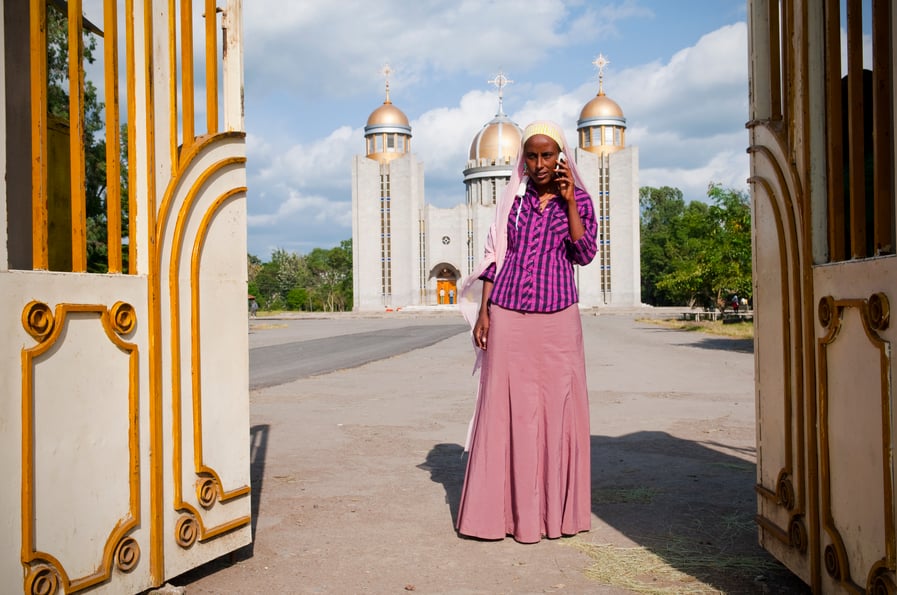Last month the Ethiopian government indicated it would be pushing ahead with its intention to liberalise the country’s telecommunications industry, revealing plans to issue licences to two new operators to compete with the state monopoly Ethio Telecom.
On 5th July, the government announced it would also be divesting a 49 percent stake in Ethio Telecom itself. The move has reaffirmed the interest of foreign network operators, and a string of mobile payments companies behind them, who have long sought involvement in the telecoms industry’s “final frontier” – a market of 105 million people with one of the lowest mobile penetration rates in Africa.
A bidding process for the two network operator licences is due to open in September, with the successful companies anticipated to launch operations in 2020 using Ethio Telecom’s infrastructure. No timeline has yet been announced for the sale of Ethio Telcom, although the company will be divided into an infrastructure developer and a network service provider, both of which will involve the new private partner. Addis Ababa has hosted visitors from potential French, Emirati, Kenyan, South African and American candidates in recent months, and interest is likely to grow further ahead of the network operator bid deadline.
However, the play comes with potential headwinds. Below, we examine the core political and operational risks:
- Diminishing political capacity for reform. With national elections approaching in 2020, there are doubts as to whether prime minister Abiy Ahmed’s government will be able to spare the resources necessary to follow through on the proposed licence awards, which will also require the creation of a new regulator. Abiy’s attention has been divided by a range of domestic issues which have quickly made the fanfare accompanying his 2018 election on a vigorous reform agenda a distant memory. Inter-communal tensions have created an internally displaced population of 3 million – the world’s largest. Meanwhile, anti-government activity is increasingly occupying Abiy’s attention – as underlined by events in late June, when a failed attempt to seize control of one of Ethiopia’s northern states resulted in the death of senior officials including the country’s chief of staff for the defence forces and the regional president.
- Potential fragmentation of the ruling coalition. Given increasing splits within the ruling Ethiopian People’s Revolutionary Democratic Front (EPRDF), as well as Abiy’s avowed determination to hold free and fair elections, next year’s polls present the distinct possibility of a recalibration of the key stakeholders within government. As a worse-case scenario, this could result in a roll-back of the telecoms reforms: Abiy’s precursor as prime minister refused to relinquish the lucrative “cash cow” of Ethio Telecom’s monopoly to foreign control, and there remains some support within older generations of the EPRDF for such a stance. Alternatively, there are widespread rumours that the elections in 2020 may be postponed, owing to continued security concerns as well as a failure to complete the national census. A delayed election would risk significantly destabilising the EPRDF, and again could dampen support for telecoms industry reform.
- Unreliable infrastructure. Government officials have indicated that new operators will be expected to initially use Ethio Telecom’s infrastructure to offer their services. However, Ethio Telecom is notorious for offering slow, expensive and unreliable phone and internet services courtesy of its dated Soviet infrastructure. Ethio Telecom’s new private investor will likely be required to fund a significant portion of the estimated USD 2.2 billion investment required to modernise the country’s telecoms infrastructure. The new partner and the two new operators also risk exposure to reported corrupt practices within the company’s management and supply chain, as well as unplanned government interruption to national network infrastructure to help quell anti-government protests.
- Scarcity of foreign exchange. Ethiopia is experiencing a significant shortage of forex, reporting a trade deficit of $3.8 billion, roughly 4.5% of GDP, for the fourth quarter of 2018. Only companies with ties to the government are given preferential access to what little forex is available, driving investors seeking to repatriate dividends to the black market. This raises the spectre of MTN Group’s struggles in Nigeria, where the South African operator was accused, among other things, by regulators of repatriating dividends illegally. A new Ethiopian market entrant might be similarly exposed, particularly given that they will be competing against a majority state-owned Ethio Telecom.
The opening of the Ethiopian market presents fundamental concerns. Will the liberalised system actually be implemented, and if so might it then be reversed? How will the new telecoms regulator treat competitors to the majority state-owned operator? More distantly, what are the regulatory implications for mobile money in a market which is yet to liberalise its banking sector? Answers to such questions are unlikely to emerge until after 2020’s planned elections.
S-RM’s Deal Advisory practice has advised on multiple telecoms transactions across sub-Saharan Africa, and is highly experienced at answering unique intelligence requirements in frontier markets. This briefing was produced by a team of Africa specialists in London and Cape Town, with in-house Amharic speaking expertise and decades of combined experience analysing political developments in Ethiopia





